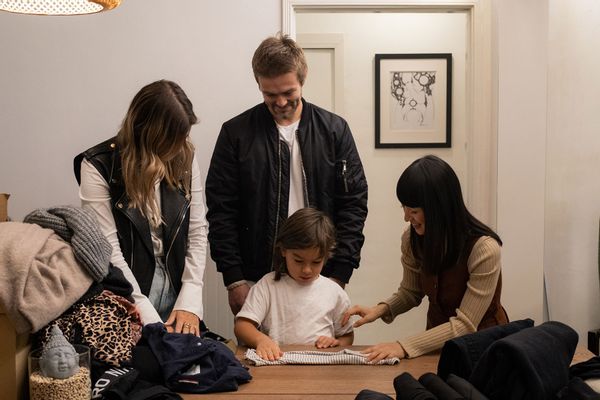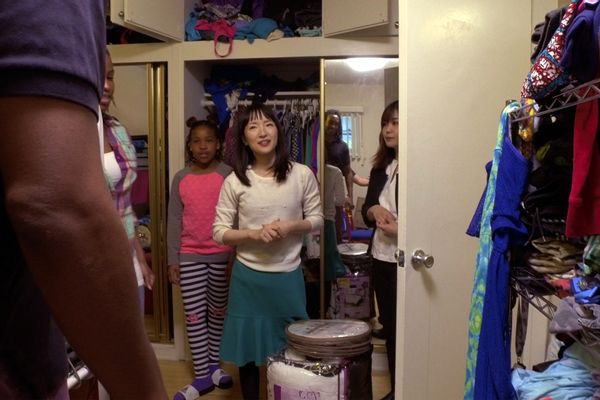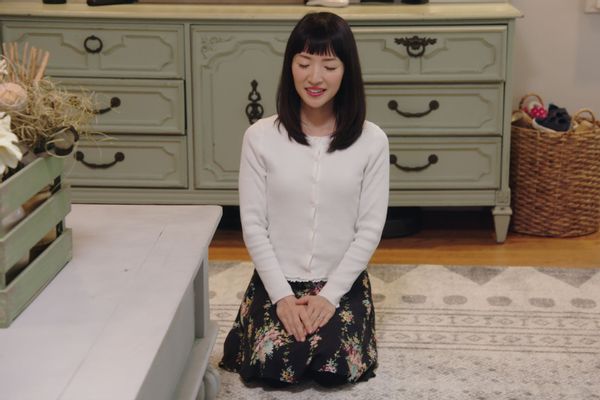
Last week Marie Kondo broke two Influencer Commandments. The first was admitting that her life had changed and, therefore, so has she. The second was reminding her public that at the end of the day, and putting aside the many millions she's made from taking The KonMari Method™ global, she is still as human as everyone else.
And, in the spirit of her life's dedication to decluttering, it only took sharing four brief words with the Washington Post to send the Internet's cul de sac of privilege into a tizzy: "My home is messy."
In a news cycle where George Santos is making a second career out of piling ridiculous lies upon lies, a person would think the "Tidying Up" expert would be met with empathy. Kondo made the admission as part of a media webinar and virtual tea ceremony, explaining how worn out she'd become since having her third child in 2021. Nearly any parent of young children should understand how starkly one's priorities shift when one's family expands.
"Up until now, I was a professional tidier, so I did my best to keep my home tidy at all times," she said during the webinar. "I have kind of given up on that in a good way for me. Now I realize what is important to me is enjoying spending time with my children at home."

Before we examine this more closely let's not fool ourselves into believing that Kondo's version of messy comes even close to the paper landslides in our homes. But if it does, so what? Realigning her idea of what's important doesn't violate the core of her mission.
Kondo's new book "Kurashi at Home: How to Organize Your Space and Achieve Your Ideal Life," preaches this. It is also the latest product in her ever-expanding brand of lifestyle goods. Being an internationally recognized organizational expert means selling things. This also makes people angry.
But that's been the case ever since Kondo's 2010 book "The Life-Changing Magic of Tidying Up" became a New York Times bestseller, the result of its 2014 release in the United States. She's an ever-renewing source of awe, resentment and misunderstanding.
Central to Kondo's KonMari Method is the concept of tidying and decluttering. That is not the same as minimalism although her neatly curated Instagram feed depicts this as her preferred aesthetic. Rather, Kondo finds virtue in respecting our objects and only surrounding ourselves with items we cherish, that "spark joy."
Let's not fool ourselves into believing that Kondo's version of messy comes even close to the paper landslides in our homes.
Her 2019 Netflix series "Tidying Up" and its 2021 follow-up "Sparking Joy with Marie Kondo" mainstreamed connecting decluttering to increased contentment. Then again, professional organizers throughout the United States have been doing exactly this, minus the Shinto-influenced spiritual undertones.
From encouraging clients to greet their houses to instructing them to let go of things we don't use or need with a heartfelt "thank you," most people embraced Kondo's holistic version of tidying in some fashion. Whether that meant embarking on the (theoretical) once-in-a-lifetime purge of unnecessary objects or bidding adieu to a sock drawer, that was, and is, entirely up to the individual.
When a sect of American home-keeping enthusiasts adopted KonMari as its new religion, the backlash to its teachings inspired an industry unto itself.
There were opportunistic parodies such as "The Joy of Leaving Your Sh*t All Over the Place" and homages like "The Life-Changing Magic of Not Giving a F**k." But mostly, there were opinion pieces – so many opinion pieces. People went on about Kondo's unrealistic expectations of perfectionism or her insistence on folding shirts a certain way. Pertinent to the topic at hand, however, were the pieces griping about her lack of consideration regarding the demands of parenting in either her original book or her 2016 follow-up, "Spark Joy."
"Marie Kondo's slightly deranged obsession with tidying is not something anyone should seek to emulate — least of all parents," wrote Tanya C. Snyder in an essay that was also published in, yes, the Washington Post. "Parenting is an exercise in juggling priorities. Can we all agree that spending time watching your newborn learn to giggle, your toddler to walk, or your preschooler to read should be at the top?"
Actually, yes. That sensation of feeling overwhelmed is precisely what led Kondo to KonMari her priorities.

As an extension of the practices the KonMari Method extols, the term "kurashi" roughly translates to "way of life" or, befitting Kondo's brand and new life reality, "the ideal way of spending our time." It is yet another fetchingly designed self-help tome inviting readers to be present in the precious moments in one's life and has nothing to do with keeping or tossing one's figurine collection.
But never mind all of that, because, to Kondo's detractors, the world-renowned tidying expert's admission that she's messier than she used to be is further evidence of her hypocrisy.
Sarah Polley, the Oscar-nominated writer, and director of "Women Talking" (oh, the irony) reacted thusly on Twitter: "She admits she has 'kind of given up' on tidying after three kids. Where is the official apology to those of us who she influenced to make our clothes into little envelopes while we HAD three kids!"
Unhinged behavior pic.twitter.com/cQbNp2gfZP
— Cora Harrington (@lingerie_addict) January 29, 2023
Polley deleted the tweet, insisting she meant it as a joke. Others do not.
"The irony was the elimination of this persona's credibility once she opened up a shop selling solutions to problems that didn't exist (but were aesthetically pleasing)," tweeted Nelly Leo. "Are we done with this sort of thing now? If so, I'll have some cake."
The shade goes on and on.
Nearly any parent of young children should understand how starkly one's priorities shift when one's family expands.
Those who take issue with Kondo selling organizational-themed items through her company have a point . . . as long as they also take issue with Martha Stewart's merchandising. Did they also rant about products related to the magazine Real Simple, which has been selling its vision of pared-down domesticity and all manner of accouterments to make that possible since 2000? If so, I hope they also clapped back at the women on "The Home Edit" for their store or Ina Garten for saying, "Store-bought is fine."

Lifestyle influencers make a vocation out of selling some lovelier version of life, presenting a model to which we can aspire. But at the end of the day, they're also just people.
Those for whom Kondo's admitted relaxing of her tidying standards is tantamount to fraud may not admit that they ever viewed her as fully human in the first place. Many of the early trend stories about Kondo go into great detail about her height – she's 4-foot-8 – and her frame, as if to meet the reader's picture of her being some kind of otherworldly figure or anime drawing. During the height of her Netflix series' popularity, it wasn't uncommon to hear her being described as child-like, "cute," or for someone to squeal something along the lines of wanting to put her into their pocket.
When those people are reminded that she's a successful entrepreneur and a married person who has three kids, that flies in the face of all their expectations. After all, Kondo's decluttering mission is domestic work, a burden in this country long borne by people of color.
The ire directed toward Kondo right now is a new vintage of the classic hits she dealt with before. As many folks have pointed out, neither Kondo nor any representatives from her company came over to anyone's house and forced them to do anything.
If you reduced your beloved home libraries to 30 books and regret getting rid of some volumes because you thought a famous stranger advised you to, that's on you. (She insists there was a misunderstanding, that you could always keep your books.) If you were among the hundreds of thousands of folks around the country who stuffed Goodwill's donation bins past bursting and feel lighter for having purged, does Kondo's decision to ease up on making hospital corners with her bedsheets every day change that? Probably not.
Simply recognize that Kondo's life has evolved, requiring her to make a few adjustments to it. Nothing about her methods has fundamentally changed, and her opening observation in the first "Tidying Up" episode proves it. "When you have young children, maintaining a tidy household is a struggle," she said.
Four years later, she's choosing to relent on struggling so hard. That shouldn't "spark joy" at her expense. We should find comfort in her relating better to our present way of being, which says, "Relax. Decluttering can wait."







